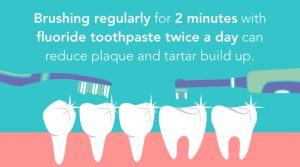How to Maintain and Improve Your Oral Health
As you age changes can occur, even in your mouth. The nerves in your teeth can become smaller, making your teeth less sensitive to cavities or other problems. If you don’t make regular dental visits and get your teeth examined, problems may not be diagnosed until too late.
- Brush twice a day using a toothbrush with soft bristles. You may also benefit from using an electric toothbrush.
- Clean between your teeth once a day with floss or another flossing tool.
- If you wear full or partial dentures, remember to clean them on a daily basis. Take your dentures out of your mouth for at least four hours every day. It’s best to remove them at night.
- Drink tap water. Since most contains fluoride, it helps prevent tooth decay no matter how old you are.
- Quit smoking. Besides putting you at greater risk for lung and other cancers, smoking increases problems with gum disease, tooth decay and tooth loss.
Certain medications that you take may give you dry mouth. Therefore:
• Drink more water. Carry a water bottle with you, and don’t wait until you’re thirsty to drink. Your mouth needs constant lubrication.
• Use sugar-free gum or lozenges to stimulate saliva production.
• Get a humidifier to help keep moisture in the air.
• Avoid foods and beverages that irritate dry mouth, like coffee, alcohol, carbonated soft drinks, and acidic fruit juices
VISIT YOUR DENTIST REGULARLY FOR A COMPLETE DENTAL CHECK-UP
Caregiving for a Disabled or Elderly Loved One

Get expert insights on dental care for ageing adults. Discover the importance of regular dental check-ups, proper oral hygiene habits, and effective solutions for common dental issues.
You may have a parent, spouse or friend who has difficulty maintaining a healthy mouth on their own. How can you help? Two things are critical:
• Help them keep their mouth clean with reminders to brush and floss daily
• Make sure they get to a dentist regularly
.
WHITE BRIGHT & STRAIGHT TEETH
FOR A YOUTHFUL LOOK
Scaling and polishing – Refers to a clean-up for teeth. Regular dental check ups lead to better oral health.
Veneers – Enhance your smile instantly. Strong thin pieces of ceramic or resin material that are bonded to the teeth can repair chipped, decayed or stained teeth and close gaps.
Crowns – Crowns can protect damaged cracked or broken teeth. They cover the entire tooth that appears above the gum line.
Bridges and Implants – Can replace missing teeth. Bridges are false teeth bolstered in place with the support of neighbouring teeth while implants are false teeth with crowns on the anchoring teeth.
Bonding – Applying composite tooth bonding is a restorative procedure that uses tooth enamel-coloured composite resin (plastic) to repair teeth that are decayed, chipped, fractured or discoloured. Tooth gaps can also be closed.
Root Canal – Root canals treat diseases or abscessed teeth. Once a tooth is injured, cracked or decayed, it is necessary to open the tooth and clean out the infected tissue in the centre. This space is then filled and the opening sealed.













